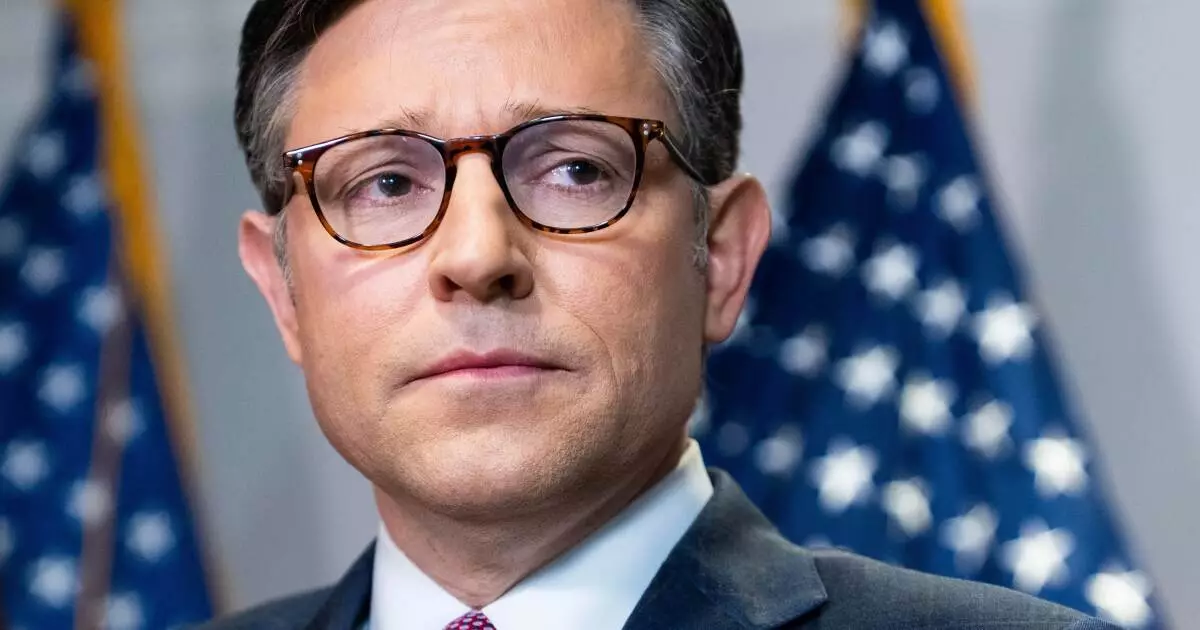The ongoing struggles within House Republicans over critical pieces of legislation underscore a growing rift that not only threatens the party’s unity but also jeopardizes the continuity of government operations ahead of an impending fiscal deadline. As the government approaches a possible shutdown on September 30, legislative decisions have taken on heightened significance, especially as Congress grapples with intertwining issues of voter regulation and federal funding.
At the center of the legislative clash lies the “Safeguard American Voter Eligibility Act.” This proposed legislation seeks to enhance voting security by imposing additional restrictions to prevent non-citizens from participating in presidential elections. Notably, such participation is already prohibited. House Speaker Mike Johnson from Louisiana is taking a personal interest in pushing this bill through Congress, declaring it “one of the most important votes” lawmakers may encounter during their tenures. Such proclamations suggest a pivotal moment, yet they also raise questions about ideological motives and party cohesion.
Despite the urgency, the bill has faced significant pushback even from within the GOP. As discussions progressed, Speaker Johnson decided to withdraw the bill from the legislative agenda amid dissent from party members who prioritize military spending over domestic voting matters. In this complicated political landscape, it’s essential to recognize the implications of these developments: while some legislators are focused on election integrity, others perceive such directives as distractions from pressing issues like national defense funding.
The ripple effects of a potential government shutdown extend far beyond Capitol Hill. Local governments, which depend heavily on federal funds, are bracing for the impact of disruptions in appropriations. According to advocates from the National Association of Counties, over one-third of county revenues derive from federal sources, emphasizing the critical reliance on such funding for local governance. Nicole Weissman, the director of strategic communications for the Association, articulated the precarious balance local governments must maintain in terms of fiscal management and operational planning.
The reimbursement model employed for federal grants exacerbates these financial concerns. Government entities are required to expend their funds upfront and await reimbursement, a process that is contingent on the smooth operation of federal agencies. Should a shutdown occur, local budgets, already stretched thin, would assume additional layers of debt and uncertainty. The implications of such a situation could severely hamper essential services and long-term projects that rely on these critical funds.
The Broader Budgetary Implications
A proposed spending package, estimated at $1.6 trillion, aims to maintain existing funding levels for six months. This stopgap approach reflects the tumultuous state of Congressional appropriation processes, further complicated by competing priorities among lawmakers. Former President Trump has shown support for this proposal, which positions it as a tactical maneuver within the broader political landscape. The notion of operating under a continuing resolution until March 28 suggests a calculated delay—affording Congress the opportunity to reassess funding priorities once a new president, possible with a shifted political climate, takes office in 2025.
Navigating the intricate appropriations process has become a labyrinthine challenge for lawmakers. The cycle commences with the presidential budget submission in February, and the rhythm dictates a series of collaborative efforts to finalize expenditures by June 30. However, this idealistic timeline has been severely disrupted, evidenced by former Speaker Kevin McCarthy’s ousting due to harsh disagreements over spending bills. The intertwining of budgetary demands from ongoing international conflicts, like those in Ukraine and Israel, highlights another dimension of complexity, where legislative priorities repeatedly clash.
Conclusion: The Urgency for Governance Stability
The ongoing squabbles within the House GOP over budget and voting legislation reveal more than just party discord; they illuminate the vulnerabilities in the nation’s governance processes. The specter of a government shutdown looms, threatening not just federal functionality but also local fiscal health. The urgent need for responsible governance, characterized by effective dialogue and strategic compromises, is essential to navigating these turbulent times. Moving forward, it becomes imperative for lawmakers to prioritize cooperation and operational continuity over partisan bickering if they hope to protect the interests of all Americans while ensuring a stable and functioning government.

